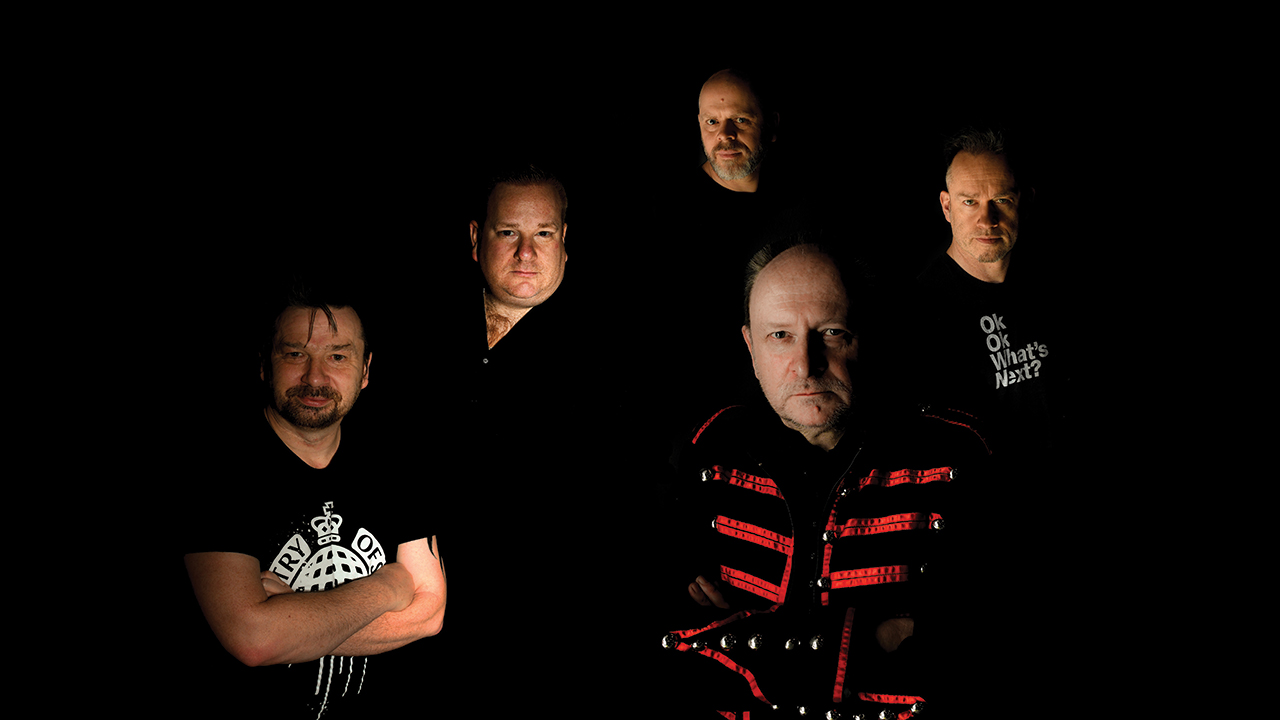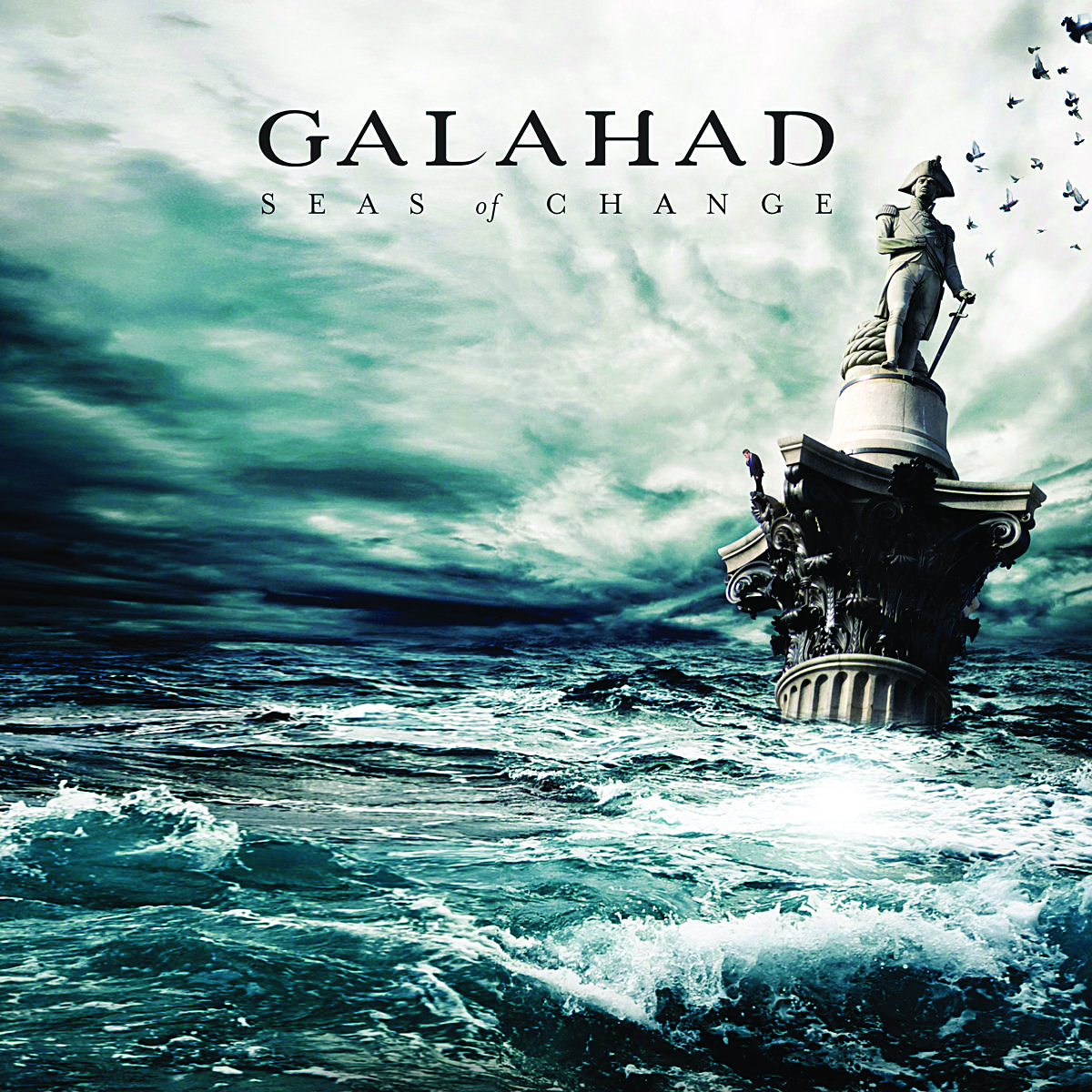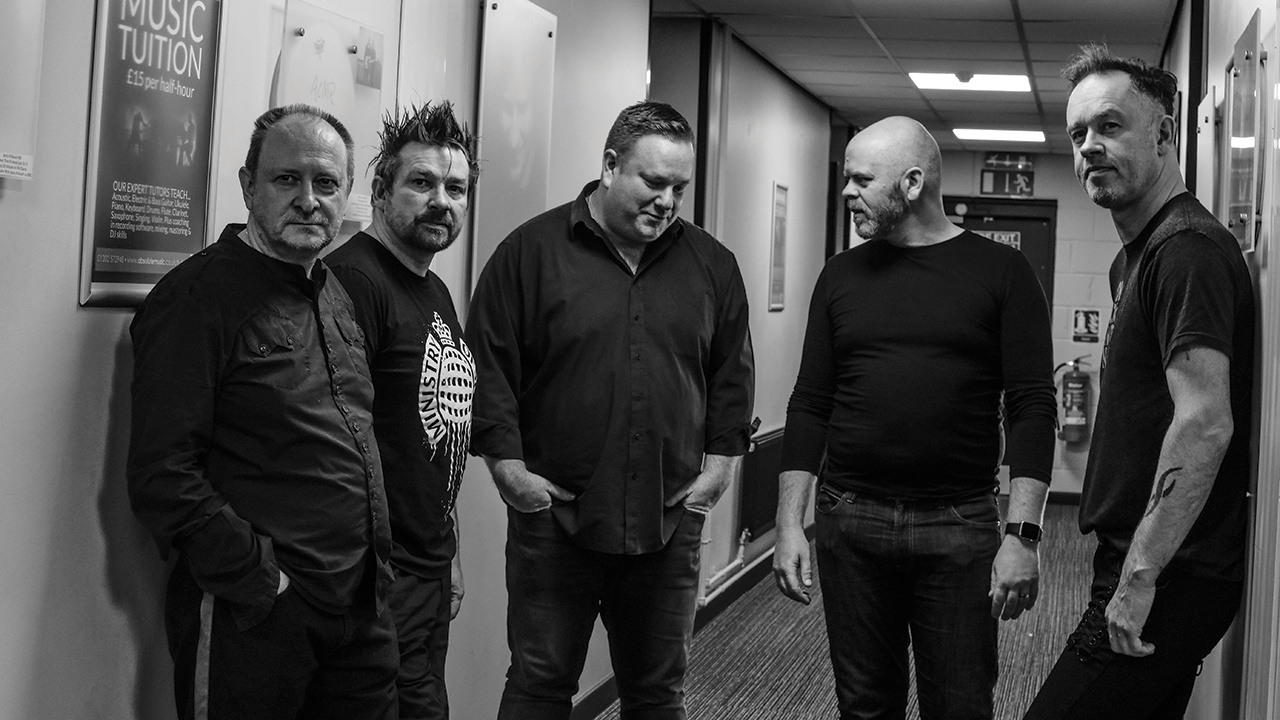“We give Yes a run for their money when it comes to changing band line‑ups!" Galahad and the story of Seas Of Change
How UK prog rockers Galahad's made their eleventh studio album, 2018's Seas Of Change, amid fluctuating line-up upheaval

If someone ever gets round to drawing Galahad’s family tree, they may well find it doesn’t resemble a tree at all – more of a tangled bush, many of whose branches sprout, blossom, wither and die, then re-emerge further up the vine.
“We give Yes a run for their money when it comes to changing band line‑ups,” admits frontman and sole remaining founder member Stuart Nicholson, grinning ruefully as he sips a lunchtime beer in a central London pub. As we speak, they’re about to have updated band photos taken in the light of the latest departure from their ranks, which has been confirmed since the publicity shots were taken for their 10th studio album, Seas Of Change.
It turns out Tim Ashton, who was first part of Galahad for three years around the turn of the 90s and who then returned to the role in 2014, has jumped ship for a second time.
It’s a familiar problem round these parts. Pursuing a less commercially lucrative style such as prog in 2018 is often a case of arranging gigging, rehearsing, recording and promotion around day (or in one case, night) jobs and domestic commitments.
Nicholson himself manages to steer the ship either side of working in that most rock’n’roll of professions, accountancy, and has today travelled up to London from his Dorset base partly to meet with a work client. But the band still come first. Some of Galahad, over the years, have struggled to make the same commitment.
“Tim likes travelling,” Nicholson says of Ashton, “which is why he left the band in the first place [in 1992]. Then he ended up in the Philippines, and he was still going back and forward there for a while, even after he rejoined us. So we said, ‘Look, Tim you can’t keep flitting back and forth and expect to still be in the band. Then last year he had a few personal and financial issues and he decided to go back to the Philippines. He seemed to think there was no other option for him. So we parted company again just before Christmas and now we’ve got [erstwhile Twelfth Night and LaHost multi-instrumentalist and singer] Mark Spencer on bass – who, ironically, was the man that Tim originally replaced back in 2014.”

Such is the tangled web that Galahad weave. But few of their personnel changes have been as strange as the departure of founding guitarist Roy Keyworth, confirmed before the release of last autumn’s collection of shorter compositions, Quiet Storms. In the world of internet dating, there’s a phenomenon known as ‘ghosting’, where a correspondent suddenly stops responding to any sort of communication and basically appears to be hiding behind a virtual sofa until the knocks on their door subside and their suitor goes away.
Sign up below to get the latest from Prog, plus exclusive special offers, direct to your inbox!
This scenario isn’t often associated with bands, but that’s basically what happened here – Keyworth simply went AWOL. And although he formed Galahad with Nicholson back in 1985, this wasn’t the first time he’d done a bunk.
“He first left in 1998,” Nicholson explains, “straight after we finished recording Following Ghosts, which was bizarre because we had gigs lined up. But he’s not very good at seeing other people’s point of view. For instance, he works nights, and when he first told me about that, I said, ‘How are we going to do the band?’ and he hadn’t really considered it. So eventually we could only do things on Sundays, which is hardly ideal.”
Still, there was little warning of what came next.
“We’d just got back from a gig in Holland in November 2015 and he was walking up the drive with his girlfriend, and he said, ‘Let me know if anything else comes up.’ But then suddenly he wouldn’t return calls, ignored us on social media, emails, messenger… We sent him demos of 20-odd tracks including Seas Of Change and he just didn’t respond. We sent him a vinyl copy of [2007 album] Empires Never Last when it was reissued, and he loves his vinyl. Didn’t respond. I asked him to play guitar on Quiet Storms. Didn’t respond.
“So he never actually said he’d left the band. Eventually we asked Andrew Wild, who wrote our biography, to see if he could get a response and he told him, ‘Andy, I’m no longer in the band and I’m selling all my gear.’ It is quite sad, but we have to move on.”
While the demise of such a long-standing working relationship and friendship is always going to be a source of dismay, it also meant that Galahad needed a new guitarist. And just in time to record the more ambitious material we find on the 43-minute suite that comprises new album Seas Of Change, Lee Abraham has stepped in, having previously played bass in Galahad from 2005-2009.
No fewer than 21 people have been members of Galahad over the years (and two of them have sadly passed away). However, the trio of Nicholson, co-songwriter and keyboard maestro Dean Baker, and drummer of 30 years Spencer Luckman keep the band’s heart pumping powerfully. And Seas Of Change serves notice that Galahad's music remains as vital and relevant in 2018 as it has ever been.
This one-track album takes as its lyrical subject matter the turbulent times currently facing this country of ours, as Brexit and its fallout tear at the social fabric of this sceptred isle. The blissful classical piano, flute, sweeping strings and ethereal female vocals of its opening passages are punctuated by a vintage spoken word sample warning us ‘the logic of power was moving towards its conclusion’. Then we hear a crowd hush and a toastmaster propose a toast to ‘total confusion, served up with a healthy smattering of understated incredulity, topped off with a heady dose
of utter bemusement’. Hints of black humour notwithstanding, it’s the introduction to thunderous flashes of symphonic prog over which Nicholson sings, ‘Batten down the hatches, boys and girls, in readiness for the storm ahead.’
So, ‘confusion, incredulity, bemusement’… we take it Galahad’s lyricist wasn’t expecting the referendum result we woke up to on June 24, 2016?
“It does broadly describe my feelings,” he says. “It’s not supposed to be a political album as such, just someone saying, ‘What’s going on here?’ It doesn’t make sense: screwing our society, making people argue with each other… There’s been so much vehemence and antipathy, and it was very divisive. It actually got a bit scary at times.”
Elsewhere, the lyrics hint at the possibility of social unrest in the wake of all this.
“Yeah, I thought that because of what was being said, it might all kick off – the last time that happened was the poll tax riots, but there have been times recently when it looked like things could get out of hand.”
But for all the drama of the picture Galahad paint, there are also playful moments. ‘A sense of revolution is forming in the air,’ Nicholson sings at the start of side two, accompanied by an arresting synth riff, ‘and the wall of death is lowered in Parliament Square.’
An alarming, dystopian image… or a cheeky nod to the lyric of Genesis’ Fly On A Windshield? You decide.
Nicholson smiles at the mention of it. “It’s a bit of fun, really. I always try to get something in to acknowledge where we’ve come from – sometimes it’s subtle, sometimes it’s not.”

It’s a reflection of a band that still take inspiration from the golden age of prog but also sound in tune with 21st-century progressive music. The swathes of synth rock and the use of vintage radio samples might remind you of Public Service Broadcasting, but then Lee Abraham’s breathtaking guitar breaks channel Dave Gilmour, and Nicholson’s quivering alto vocals have always sounded redolent of Fish, much as our interviewee might tire of the Marillion comparisons.
That’s perhaps to be expected, given that Galahad formed around the peak of neo-prog in the mid‑80s… then found that the bandwagon had already moved on. Or, more likely, they didn’t know there was a bandwagon.
“We didn’t actually know about bands like IQ and Twelfth Night or Pendragon when we started – it was great to find out there were bands playing that kind of music, but we just happened to be influenced by the same bands as them.
“But our timing was actually crap!” Nicholson laughs. “By the time we made our first album Nothing Is Written in 1991, most of the bands that followed Marillion had faded and labels were no longer interested in prog.”
One route to further exposure for Galahad that Nicholson briefly explored was an unconventional one – towards the end of 1988, he auditioned to be Marillion’s singer.
“Yeah, that’s 30 years ago this year. Christ!” he says. “After Fish left, I naïvely thought I could keep Galahad going and still join Marillion. But I didn’t even expect to get an audition – my demos were terrible. To make my tape, I sat by my music centre with a microphone, and had Marillion records on the left hand side and my vocals on the right hand side – because that was all I had! I sang to Kayleigh or something and sent it off.
“Amazingly, they asked me to come up to London to audition. But that was also surreal because it was the day of the Clapham rail crash, and I’d chosen to drive up to London and not get the train that day. I was sat there waiting to audition with all this carnage on the TV, and I’m going white, thinking, ‘That could have been me!’
“Anyway, the guys were all really friendly, and we tried out a few songs – Forgotten Sons, Blue Angel, Bitter Suite. Of course, nothing came of it, but it actually ended up being good publicity for Galahad and it resulted in us getting our first gigs in London at the Royal Standard in Walthamstow.”
Nonetheless, Galahad still faced an uphill struggle to find an audience.
“There was no internet so you needed press coverage,” Nicholson explains. “But the music papers wouldn’t touch us, and we weren’t rock enough for magazines like Kerrang! and Metal Hammer.”
Youthful self-belief is a powerful force, however, and after the internet made it easier for progressive artists to find their market directly, Galahad found a new lease of life, doubtless helped by promotion in magazines like this one.
For all his fears for British society surrounding Brexit, Nicholson sees positive signs for Galahad and British prog in the years ahead.
“We’ve had our best ever feedback via social media, and we’ve had strong pre-orders for this album – with over 50 per cent on vinyl! We’re doing black, turquoise and a picture disc and some people are ordering all of them…
“People are a lot more broad in their tastes than they used to be when we started,” he adds, “and more prepared to listen. That said, I still like the idea of belonging to a bit of a tribe, and the prog scene is a bit like that – in a positive way, I think.
“The music is spreading and I take my hat off to someone like Steven Wilson – I never thought a band of this generation would be popular enough to fill the Albert Hall. Things like that give me hope for the future.”
And even if Galahad’s line-up continues to resemble a game of musical chairs, you suspect that with such a determined driving force behind them, they won’t be disappearing off the radar any time soon.
This article originally appeared in issue 86 of Prog Magazine.
Johnny is a regular contributor to Prog and Classic Rock magazines, both online and in print. Johnny is a highly experienced and versatile music writer whose tastes range from prog and hard rock to R’n’B, funk, folk and blues. He has written about music professionally for 30 years, surviving the Britpop wars at the NME in the 90s (under the hard-to-shake teenage nickname Johnny Cigarettes) before branching out to newspapers such as The Guardian and The Independent and magazines such as Uncut, Record Collector and, of course, Prog and Classic Rock.

